江苏省2011届高三英语牛津版必修五综合模拟卷(含解析)
- 格式:doc
- 大小:285.00 KB
- 文档页数:13
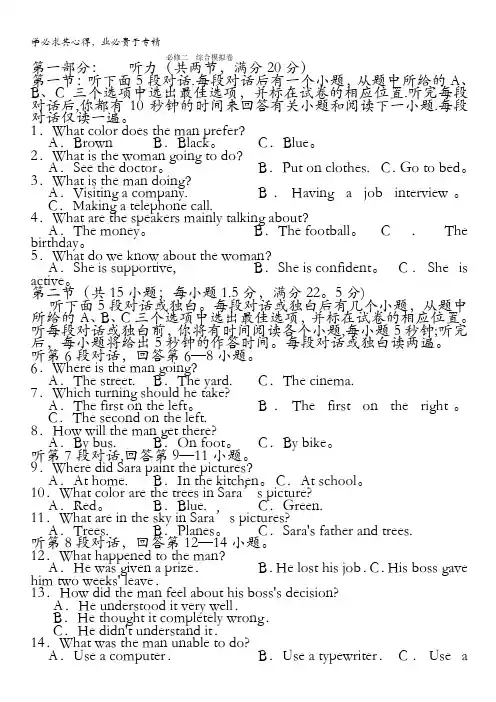
学必求其心得,业必贵于专精必修二综合模拟卷第一部分:听力(共两节,满分20分)第一节:听下面5段对话.每段对话后有一个小题,从题中所给的A、B、C三个选项中选出最佳选项,并标在试卷的相应位置.听完每段对话后,你都有10秒钟的时间来回答有关小题和阅读下一小题.每段对话仅读一遍。
1.What color does the man prefer?A.Brown B.Black。
C.Blue。
2.What is the woman going to do?A.See the doctor。
B.Put on clothes. C.Go to bed。
3.What is the man doing?A.Visiting a company. B.Having a job interview。
C.Making a telephone call.4.What are the speakers mainly talking about?A.The money。
B.The football。
C.The birthday。
5.What do we know about the woman?A.She is supportive, B.She is confident。
C.She is active。
第二节(共15小题;每小题1.5分,满分22。
5分)听下面5段对话或独白。
每段对话或独白后有几个小题,从题中所给的A、B、C三个选项中选出最佳选项,并标在试卷的相应位置。
听每段对话或独白前,你将有时间阅读各个小题,每小题5秒钟;听完后,每小题将给出5秒钟的作答时间。
每段对话或独白读两遍。
听第6段对话,回答第6—8小题。
6.Where is the man going?A.The street. B.The yard. C.The cinema.7.Which turning should he take?A.The first on the left。
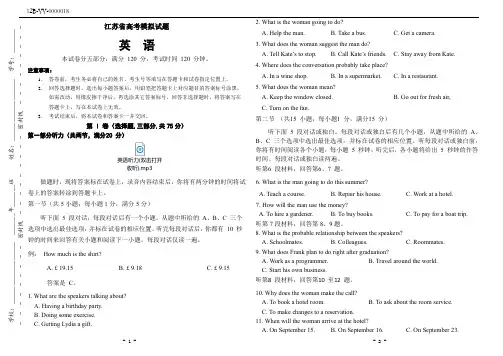
学校:____________________ _______年_______班 姓名:____________________ 学号:________- - - - - - - - - 密封线 - - - - - - - - - 密封线 - - - - - - - - -江苏省高考模拟试题英 语本试卷分五部分,满分 120 分,考试时间 120 分钟。
注意事项:1. 答卷前,考生务必将自己的姓名、考生号等填写在答题卡和试卷指定位置上。
2. 回答选择题时,选出每小题答案后,用铅笔把答题卡上对应题目的答案标号涂黑。
如需改动,用橡皮擦干净后,再选涂其它答案标号,回答非选择题时,将答案写在答题卡上,写在本试卷上无效。
3.考试结束后,将本试卷和答案卡一并交回。
第 I 卷(选择题,三部分,共75分)第一部分听力(共两节,满分 20 分)英语听力(双击打开收听).mp3做题时,现将答案标在试卷上,录音内容结束后,你将有两分钟的时间将试卷上的答案转涂到答题卡上。
第一节(共5小题;每小题1分,满分5分)听下面 5 段对话,每段对话后有一个小题。
从题中所给的 A 、B 、C 三个选项中选出最佳选项,并标在试卷的相应位置。
听完每段对话后,你都有 10 秒钟的时间来回答有关小题和阅读下一小题。
每段对话仅读一遍。
例: How much is the shirt?A. £ 19.15B. £ 9.18C. £ 9.15答案是 C 。
1. What are the speakers talking about? A. Having a birthday party. B. Doing some exercise. C. Getting Lydia a gift.2. What is the woman going to do? A. Help the man.B. Take a bus.C. Get a camera.3. What does the woman suggest the man do? A. Tell Kate’s to stop. B. Call Kate’s friends. C. Stay away from Kate.4. Where does the conversation probably take place? A. In a wine shop.B. In a supermarket.C. In a restaurant. 5. What does the woman mean?A. Keep the window closed.B. Go out for fresh air,C. Turn on the fan.第二节 (共 15 小题;每小题 1 分,满分 15 分)听下面 5 段对话或独白。
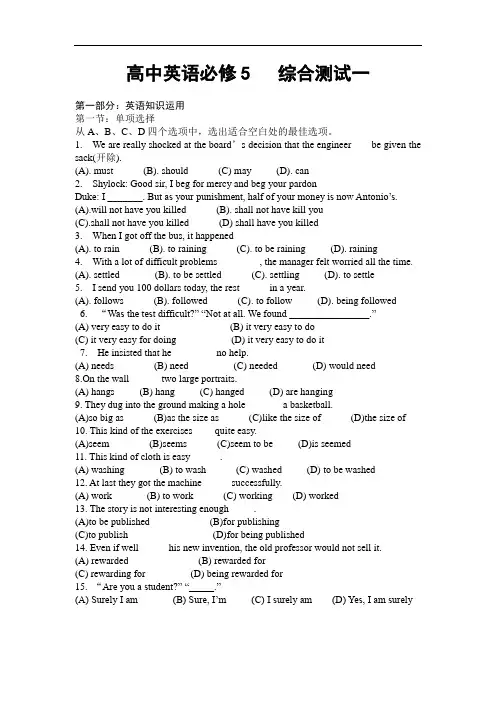
高中英语必修5 综合测试一第一部分:英语知识运用第一节:单项选择从A、B、C、D四个选项中,选出适合空白处的最佳选项。
1. We are really shocked at the board’s decision that the engineer ___ be given the sack(开除).(A). must (B). should (C) may (D). can2. Shylock: Good sir, I beg for mercy and beg your pardonDuke: I _______. But as your punishment, half of your money is now Antonio’s. (A).will not have you killed (B). shall not have kill you(C).shall not have you killed (D) shall have you killed3. When I got off the bus, it happened _________(A). to rain (B). to raining (C). to be raining (D). raining4. With a lot of difficult problems ________, the manager felt worried all the time.(A). settled (B). to be settled (C). settling (D). to settle5. I send you 100 dollars today, the rest _____ in a year.(A). follows (B). followed (C). to follow (D). being followed6.“Was the test difficult?” “Not at all. We found ________________.”(A) very easy to do it (B) it very easy to do(C) it very easy for doing (D) it very easy to do it7.He insisted that he _______no help.(A) needs (B) need (C) needed (D) would need8.On the wall______ two large portraits.(A) hangs (B) hang (C) hanged (D) are hanging9. They dug into the ground making a hole _______a basketball.(A)so big as (B)as the size as (C)like the size of (D)the size of10. This kind of the exercises ____quite easy.(A)seem (B)seems (C)seem to be (D)is seemed11. This kind of cloth is easy _____ .(A) washing (B) to wash (C) washed (D) to be washed12. At last they got the machine successfully.(A) work (B) to work (C) working (D) worked13. The story is not interesting enough ____ .(A)to be published (B)for publishing(C)to publish (D)for being published14. Even if well _____ his new invention, the old professor would not sell it.(A) rewarded (B) rewarded for(C) rewarding for (D) being rewarded for15. “Are you a student?” “_____.”(A) Surely I am (B) Sure, I’m (C) I surely am (D) Yes, I am surely第二节:完形填空阅读下面短文,从短文后所给各题的四个选项(A、B、C、D)中选出能填入空白处的最佳选项。
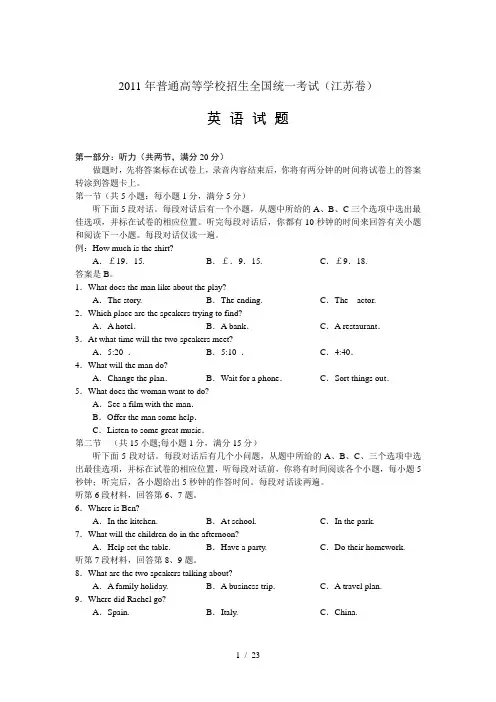
2011年普通高等学校招生全国统一考试(江苏卷)英语试题第一部分:听力(共两节,满分20分)做题时,先将答案标在试卷上,录音内容结束后,你将有两分钟的时间将试卷上的答案转涂到答题卡上。
第一节(共5小题:每小题1分,满分5分)听下面5段对话。
每段对话后有一个小题,从题中所给的A、B、C三个选项中选出最佳选项,并标在试卷的相应位置。
听完每段对话后,你都有10秒钟的时间来回答有关小题和阅读下一小题。
每段对话仅读一遍。
例:How much is the shirt?A.£19.15. B.£.9.15. C.£9.18.答案是B。
1.What does the man like about the play?A.The story. B.The ending. C.The actor. 2.Which place are the speakers trying to find?A.A hotel.B.A bank.C.A restaurant.3.At what time will the two speakers meet?A.5:20 .B.5:10 .C.4:40.4.What will the man do?A.Change the plan.B.Wait for a phone.C.Sort things out.5.What does the woman want to do?A.See a film with the man.B.Offer the man some help.C.Listen to some great music.第二节(共15小题;每小题1分,满分15分)听下面5段对话。
每段对话后有几个小问题,从题中所给的A、B、C、三个选项中选出最佳选项,并标在试卷的相应位置,听每段对话前,你将有时间阅读各个小题,每小题5秒钟;听完后,各小题给出5秒钟的作答时间。
每段对话读两遍。
听第6段材料,回答第6、7题。
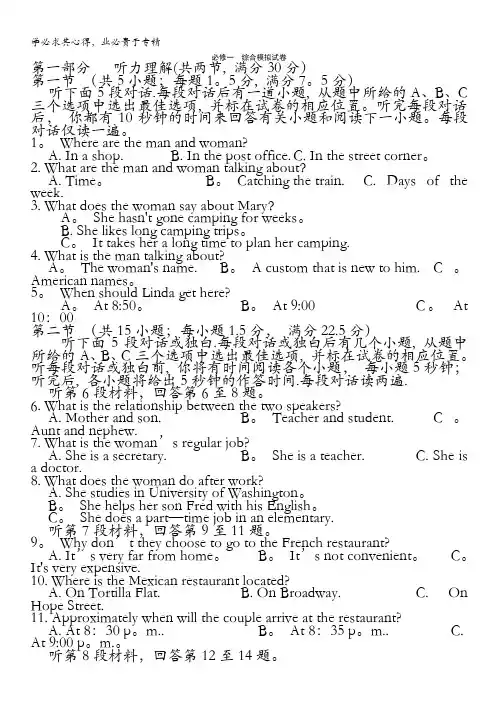
学必求其心得,业必贵于专精必修一综合模拟试卷第一部分听力理解(共两节, 满分30分)第一节(共5小题;每题1。
5分, 满分7。
5分)听下面5段对话.每段对话后有一道小题, 从题中所给的A、B、C 三个选项中选出最佳选项, 并标在试卷的相应位置。
听完每段对话后,你都有10秒钟的时间来回答有关小题和阅读下一小题。
每段对话仅读一遍。
1。
Where are the man and woman?A. In a shop.B. In the post office.C. In the street corner。
2. What are the man and woman talking about?A. Time。
B。
Catching the train. C. Days of the week.3. What does the woman say about Mary?A。
She hasn't gone camping for weeks。
B. She likes long camping trips。
C。
It takes her a long time to plan her camping.4. What is the man talking about?A。
The woman's name. B。
A custom that is new to him. C。
American names。
5。
When should Linda get here?A。
At 8:50。
B。
At 9:00 C。
At 10:00第二节(共15小题;每小题1.5分,满分22.5分)听下面5段对话或独白.每段对话或独白后有几个小题, 从题中所给的A、B、C三个选项中选出最佳选项, 并标在试卷的相应位置。
听每段对话或独白前, 你将有时间阅读各个小题,每小题5秒钟;听完后, 各小题将给出5秒钟的作答时间.每段对话读两遍.听第6段材料,回答第6至8题。
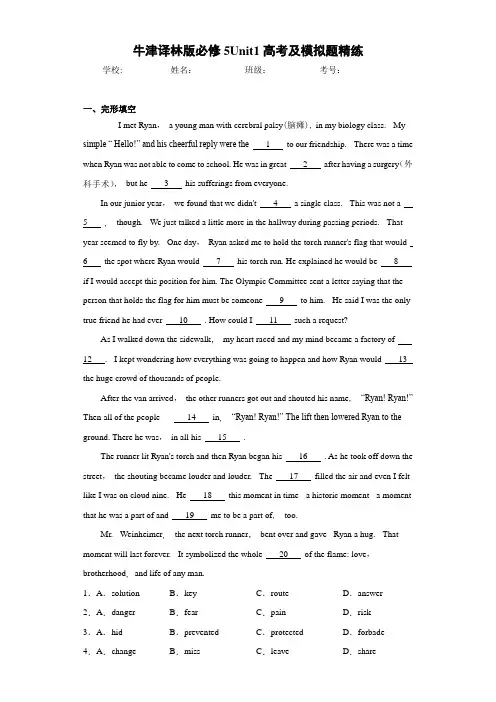
牛津译林版必修5Unit1高考及模拟题精练学校:___________姓名:___________班级:___________考号:___________一、完形填空I met Ryan,a young man with cerebral palsy(脑瘫), in my biology class. My simple “ Hello!” and his cheerful reply were the 1 to our friendship. There was a time when Ryan was not able to come to school. He was in great 2 after having a surgery(外科手术),but he 3 his sufferings from everyone.In our junior year,we found that we didn't 4 a single class. This was not a5 , though. We just talked a little more in the hallway during passing periods. That year seemed to fly by. One day,Ryan asked me to hold the torch runner's flag that would6 the spot where Ryan would7 his torch run. He explained he would be 8if I would accept this position for him. The Olympic Committee sent a letter saying that the person that holds the flag for him must be someone 9 to him. He said I was the only true friend he had ever 10 . How could I 11 such a request?As I walked down the sidewalk,my heart raced and my mind became a factory of12 . I kept wondering how everything was going to happen and how Ryan would 13 the huge crowd of thousands of people.After the van arrived,the other runners got out and shouted his name, “Ryan! Ryan!” Then all of the people 14 in, “Ryan! Ryan!” The lift then lowered Ryan to the ground. There he was,in all his 15 .The runner lit Ryan's torch and then Ryan began his 16 . As he took off down the street,the shouting became louder and louder. The 17 filled the air and even I felt like I was on cloud nine. He 18 this moment in time - a historic moment - a moment that he was a part of and 19 me to be a part of, too.Mr. Weinheimer, the next torch runner,bent over and gave Ryan a hug. That moment will last forever. It symbolized the whole 20 of the flame: love,brotherhood, and life of any man.1.A.solution B.key C.route D.answer 2.A.danger B.fear C.pain D.risk 3.A.hid B.prevented C.protected D.forbade 4.A.change B.miss C.leave D.share5.A.quarrel B.worry C.problem D.disagreement 6.A.mark B.test C.number D.decorate 7.A.cover B.begin C.continue D.lead 8.A.ashamed B.frightened C.honored D.blamed 9.A.polite B.kind C.grateful D.important 10.A.made B.ignored C.accused D.sworn 11.A.admit B.refuse C.make D.consider 12.A.chances B.questions C.choices D.scores 13.A.explain to B.differ from C.respond to D.call on 14.A.joined B.stepped C.poured D.broke 15.A.amazement B.favor C.glory D.puzzlement 16.A.training B.journey C.life D.struggle 17.A.anxiety B.satisfaction C.harmony D.excitement 18.A.deserved B.recalled C.treasured D.chose 19.A.promised B.encouraged C.allowed D.followed 20.A.mystery B.power C.information D.meaningA Toronto man is offering a free round-the-world air to the right woman. But 21 apply. You must be named Elizabeth Gallahgher and have a Canadian 22 .Jordan Axani, 28, said he and his then girlfriend, Elizabeth Gallagher, booked heavily discounted round-the-world air tickets in May, but their 23 ended and he did not want her ticket to 24 . The ticket had a strict no-transfer(不可转让) 25 , but since passport information was not required when 26 , any Canadian Elizabeth Gallagher can 27 it.“I just want to see the ticket go to good use and for someone to 28 a lot of joy,” said Axani. He posted his 29 on a social networking website, and received thousands of e-mails, including thirty from actual Elizabeth Gallagbers with the 30 passports, “More 31 , there are hundreds of Canadians who are interested in 32 their name to Elizabeth Gallagher,” Axani said. “It was absolutely out of 33 , thousands of e-mails, people around the world 34 their stories of travel.”Axani wrote in his post that he is not 35 anything in return and that the woman who uses the 36 ticket can choose to either travel with him or 37 the ticket andtravel on her own.The 38 is scheduled to start on December 21 in New York City and continue on to Milan, Prague, Paris, Bangkok and New Delhi before 39 in Toronto on January 8. He said the 40 woman will be announced on the website and the trip will be shared online. 21.A.benefits B.deposits C.restrictions D.examinations 22.A.origin B.passport C.accent D.Friend 23.A.holiday B.marriage C.dream D.relationship 24.A.go to waste B.come to mind C.go no sale D.come into effect 25.A.policy B.order C.payment D.schedule 26.A.applying B.checking C.booking D.bargaining 27.A.choose B.borrow C.use D.buy 28.A.sacrifice B.experience C.express D.provide 29.A.answer B.offer C.advice D.comment 30.A.right B.same C.now D.real 31.A.convincing B.annoying C.satisfying D.interesting 32.A.changing B.giving C.lending D.writing 33.A.touch B.question C.control D.date 34.A.admiring B.sharing C.advertising D.doubting 35.A.leaving B.dealing with C.losing D.looking for 36.A.single B.strange C.regular D.extra 37.A.return B.take C.reserve D.hide 38.A.interview B.program C.trip D.meeting 39.A.ending B.calling C.repeating D.staying 40.A.honored B.lovely C.intelligent D.lucky二、阅读选择To personal trainer Sammy Callari,13-year-old Parker Seward is more than a client (客户). He's his “little brother”. Over the past year,the pair have bonded. They play basketball together,share meals and dance to hip-hop like no one's watching.The trainer was asked to work with the 13-year-oldboy,who has Down's syndrome (唐氏综合征),because his coworker who dealt with the boy was out of town last spring. Callari had never worked with someone with a disability before. He was anxious the first day he metParker. But Parker's big smile and cheery introduction immediately put him at ease. He reminded Callari of himself when he was a teenager. Like Parker,Callari has also faced his fair share of challenges over the years.As a high schooler,Callari described himself as being the weak kid. When it came to sports,he was always overlooked. His dream of playing baseball in college quickly faded away. When he went to college,Callari turned to a new sport. His younger brother trained him to become a boxer. Callari participated in five matches. Before these competitions he was the underdog,but he won three times. “I know how it feels,” Callari said. “People tell you that you can't do this,and that you can't do that. ” When it comes to Parker,Callari refuses to accept the word “can't”.The friends meet twice a week to train. They bike,box,run and work and do push-ups.Parker has a short attention span,so it's Callari's job to keep him focused. “If Parker can do it,he's having fun,even with his frustration. Then people will ask,‘Why can't I do that?’” Callari said. “That's the whole task right now. ”Callari recalls Parker's mom once thanking him for taking a “chance” on her son. Callari told her he never viewed it that way. Parker may be the student,but Callari says he's also the one who's learning.41.Why was Callari asked to train Parker?A.They shared the same interests.B.Parker's parents had faith in Callari.C.Callari was an expert in Down's syndrome.D.Callari took place of his absent colleague.42.What can we learn about Callari when he was in high school?A.He was good at sports.B.He was out of condition.C.He was looked down upon by everyone.D.He was influenced deeply by his brother.43.What does the underlined part “that way” in Paragraph 6 mean?A.Parker's story inspires many children.B.Parker's progress is due to Callari's effort.C.Callari is also learning from Parker in the course.D.Parker is not only a client but also a friend to Callari.44.What does the text mainly talk about?A.An inspiring story of a disabled boy.B.A high schooler suffering lots of failure.C.The friendship between a disabled boy and his personal trainer.D.Ways of developing friendship with the boy with Down's syndrome.I first met Paul Newman in 1968, when George Roy Hill, the director of Butch Cassidy and the Sundance Kid, introduced us in New York City. When the studio didn’t want me for the film - it wanted somebody as well known as Paul —he stood up for me. I don’t know how many people would have done that; they would have listened to their agents or the studio powers.The friendship that grew out of the experience of making that film and The Sting four years later had its root in the fact that although there was an age difference, we both came from a tradition of theater and live TV. We were respectful of craft(技艺) and focused on digging into the characters we were going to play. Both of us had the qualities and virtues that are typical of American actors: humorous, aggressive, and making fun of each other — but always with an underlying affection. Those were also at the core(核心) of our relationship off the screen.We shared the brief that if you’re fortunate enough to have success, you should put something back —he with his Newman’s Own food and his Hole in the Wall camps for kids who are seriously ill, and me with Sunda nce and the institute and the festival. Paul and I didn’t see each other all that regularly, but sharing that brought us together. We supported each other financially and by showing up at events.I last saw him a few months ago. He’d been in and out of the hospital. He and I both knew what the deal was, and we didn’t talk about it. Ours was a relationship that didn’t need a lot of words.45.Why was the studio unwilling to give the role to author at first?A.Paul Newman wanted it.B.The studio powers didn’t like his agent.C.He wasn’t famous enough.D.The director recommended someone else.46.Why did Paul and the author have a lasting friendship?A.They were of the same age.B.They worked in the same theater.C.They were both good actors.D.They han similar charactertics.47.What does the underlined word “that” in paragraph 3 refer to?A.Their belief.B.Their care for children.C.Their success.D.Their support for each other.48.What is the author’s purpose in writing the test?A.To show his love of films.B.To remember a friend.C.To introduce a new movie.D.To share his acting experience.三、七选五Walking the Great Wall of China can be as ambitious as tackling the entire 1,800 miles from the Gobi Desert to the Yellow Sea or spending a morning or afternoon climbing a section with a tour group. 49.Read about the history of the Great Wall's construction so you can appreciate those many uneven steps.Book a half-day tour right from your Beijing hotel. Bring a bottle of water and a light bag,a hat,sunglasses and sunscreen and,of course,your camera. Obtain necessary government permits for a more ambitious independent hike. 50.Pack your equipment for a walk along all or a large section of the Great Wall and then try to reduce its weight. 51.Get good maps and study recent trip diaries and guides. Break in your climbing shoes and dont forget to put lots of bandages and sun cream in the first-aid kit.Decide whether you will begin in the Gobi Desert or at the Yellow Sea. Desert travel is tiring and slow-going. 52.Create a plan and file it with a friend you will contact at regular intervals. This is an essential safety step for an isolated,dangerous trip.53.The trip is as much about absorbing cultures as walking the Great Wall. Villagers may offer you meals and lodging. In remote areas this can be a time saver. Travel with a friend if possible;learn some basic Chinese before you go and engage pleasantly but carefully with local people in the less-developed regions.A.Accept local kindness but exercise caution.B.You can also bring nothing with you.C.Consult a good camping supply store for the lightest equipment.D.The heat is fierce so plan walks for early morning and late afternoon.E.You will connect with Chinese history and culture and test your own limits.F.Both approaches demand some physical fitness,the right shoes and preparation. 'G.Start that process months in advance of travel to ensure your trip won't be delayed.Before there was the written word, there was the language of dance. Dance expresses love and hate, joy and sorrow, life and death, and everything else in between.54.We dance from Florida to Alaska, from north to south and sea to sea. We dance at weddings, birthdays, office parties and just to fill the time.“I adore dancing,” says Lester Bridges, the owner of a dance studio in Iowa. “I can’t imagine doing anything else with my life.” Bridges runs dance classes for all ages. “Teaching dance is wonderful. 55.It’s great to watch them. For many of them, it’s a way of meeting people and having a social life.”56.“I can tell you about one young couple,” says Bridges. “They’re learning to do traditional dances. They arrive at the class in low spirits and they leave with a smile. 57.”So, do we dance in order to make ourselves feel better, calmer, healthier? Andrea Hillier says, “Dance, like the pattern of a beating heart, is life. Even after all these years, I want to get better and better.58.I fi nd it hard to stop! Dancing reminds me I’m alive.”A.So why do we dance?B.Dance in the U.S. is everywhere.C.If you like dancing outdoors, come to America.D.My older students say it makes them feel young.E.I keep practicing even when I’m extremely tired.F.Dancing seems to change their feeling completely.G.They stayed up all night long singing and dancing.四、语法填空语法填空In addition to brightening our mornings and keeping us going all day long,coffee hasbeen shown to have many health 59.(benefit). Its caffeine content is thought to improve memory in the short term. Meanwhile,studies suggest that coffee may have long-term protective effects 60.the brain,as well.Drinking coffee has 61.(previous)been linked to a reduced risk of dementia (痴呆)and Parkinson's disease,and now scientists say they have a few ideas as to why. In one study 62.(publish )recently in 63.medical journal,researchers from Rutgers Robert Wood Johnson Medical School found that a fatty acid called EHT - a substance found in coffee beans' coating - 64.(protect)the brains of mice against disease.When EHT was paired with caffeine,the researchers found the combinations of compounds improves the activity 65.helps prevent the increase of 66.(harm)proteins connected with Parkinson's disease and Lewy body dementia,one of the 67.(common)forms of dementia. The study's authors say that more research 68.(need)to determine best amount of EHT and caffeine (or,in other words,how many cups of coffee,and what types,would be most protective)for humans.五、用单词的适当形式完成短文阅读下面短文,在空白处填入1个适当的单词或括号内单词的正确形式。
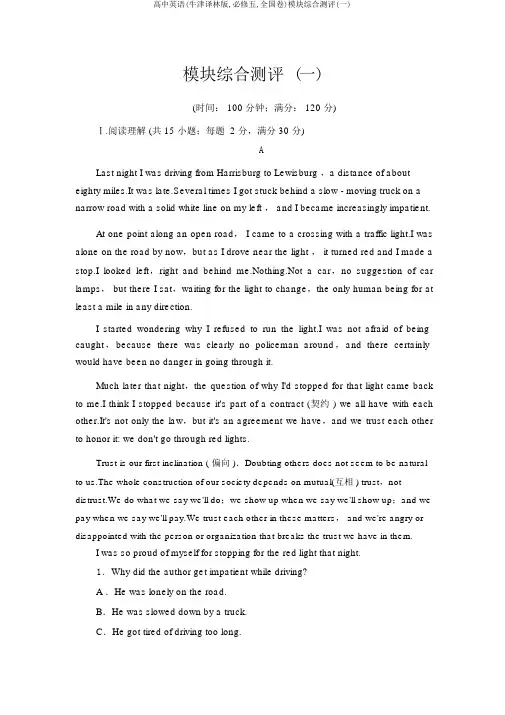
模块综合测评 (一)(时间: 100 分钟;满分: 120 分)Ⅰ.阅读理解 (共 15 小题;每题 2 分,满分 30 分)ALast night I was driving from Harrisburg to Lewisburg ,a distance of about eighty miles.It was late.Several times I got stuck behind a slow - moving truck on a narrow road with a solid white line on my left , and I became increasingly impatient.At one point along an open road, I came to a crossing with a traffic light.I was alone on the road by now,but as I drove near the light , it turned red and I made a stop.I looked left,right and behind me.Nothing.Not a car,no suggestion of car lamps, but there I sat,waiting for the light to change,the only human being for at least a mile in any direction.I started wondering why I refused to run the light.I was not afraid of being caught,because there was clearly no policeman around,and there certainly would have been no danger in going through it.Much later that night,the question of why I'd stopped for that light came back to me.I think I stopped because it's part of a contract (契约 ) we all have with each other.It's not only the law,but it's an agreement we have,and we trust each other to honor it: we don't go through red lights.Trust is our first inclination ( 偏向 ).Doubting others does not seem to be natural to us.The whole construction of our society depends on mutual(互相 ) trust,not distrust.We do what we say we'll do;we show up when we say we'll show up;and we pay when we say we'll pay.We trust each other in these matters, and we're angry or disappointed with the person or organization that breaks the trust we have in them.I was so proud of myself for stopping for the red light that night.1.Why did the author get impatient while driving?A .He was lonely on the road.B.He was slowed down by a truck.C.He got tired of driving too long.D.He came across too many traffic lights.2.What was the author's immediate action when the traffic light turned red?A .Stopping still.B.Driving through it.C. Looking around for other cars.D.Checking out for traffic police.3.The event made the author strongly believe that.A .traffic rules may be unnecessaryB.doubting others is human natureC.patience is important to driversD.a society needs mutual trust4.Why was the author proud of himself?A .He kept his promise.B.He held back his anger.C.He followed his inclination.D.He made a right decision.BchimpanzeeMost people agree that honesty is a good thing.But does Mother Nature agree? Animals can't talk ,but can they lie in other ways? Can they lie with their bodies and behavior? Animal experts may not call it lying,but they do agree that many animals,from birds to chimpanzees,behave dishonestly to fool other animals.Why? Dishonesty often helps them survive.Many kinds of birds are very successful at fooling other animals.For example,a bird called the plover sometimes pretends to be hurt in order to protect its young.Whena predator(猎食动物 )gets close to its nest, the plover leads the predator away fromthe nest.How? It pretends to have a broken wing.The predator follows the“ hurt ” adult,leaving the baby birds safe in the nest.Another kind of bird ,the scrub jay,buries its food so it always has something to eat.Scrub jays are also thieves.They watch where others bury their food and steal it.But clever scrub jays seem to know when a thief is watching them.So they go back later,unbury the food, and bury it again somewhere else.Birds called cuckoos have found a way to have babies without doing much work. How? They don't make nests.Instead, they get into other birds' nests secretly.Then they lay their eggs and fly away.When the baby birds come out,their adoptive parents feed them.Chimpanzees,or chimps,can also be sneaky.After a fight,the losing chimp will give its hand to the other.When the winning chimp puts out its hand,too,the chimps are friendly again.But an animal expert once saw a losing chimp take the winner's hand and start fighting again.Chimps are sneaky in other ways,too.When chimps find food that they love ,such as bananas,it is natural for them to cry out.Then other chimps come running.But some clever chimps learn to cry very softly when they find food.That way ,other chimps don't hear them, and they don't need to share their food.As children,many of us learn the saying“You can't fool Mother Nature.” But maybe you can't trust her,either.5.A plover protects its young from a predator by.A .getting closer to its youngB.driving away the adult predatorC.leaving its young in another nestD.pretending to be injured6.By“Chimpanzees,or chimps,can also be sneaky”(Paragraph 5 ), the author means.A .chimps are ready to attack othersB.chimps are sometimes dishonestC.chimps are jealous of the winnersD.chimps can be selfish too7.Which of the following is true according to the passage?A .Some chimps lower their cry to keep food away from others.B.The losing chimp won the fight by taking the winner's hand.C.Cuckoos fool their adoptive parents by making no nests.D.Some clever scrub jays often steal their food back.8.Which of the following might be the best title of the passage?A .Do animals lie?B.Does Mother Nature fool animals?C.How do animals learn to lie?D.How does honesty help animals survive?CStop Spam!When I first got an e- mail account ten years ago, I received communications only from family ,friends,and colleagues.Now it seems that every time I check my e-mail,I have an endless series of advertisements and other correspondence that do not interest me at all.If we want e - mail to continue to be useful ,we need specific laws that make spamming(发送垃圾邮件 )a crime.If lawmakers do not do something soon to prohibit spam,the problem willcertainly get much puter programs allow spammers to send hundreds of millions of e - mails almost instantly.As more and more advertisers turn to spam tosell their products, individual( 个人的 )e-mail boxes are often flooded with spam e-mails.Would people continue to use e-mail if they had to deal with an annoyingamount of spam each time?This problem is troubling for individuals and companies as well.Many spam e-mails contain computer viruses that can shut down the entire network of apanies rely on e-mail for their employees to communicate with each other.Spam frequently causes failures in their local communications networks, and their employees are thus unable to communicate effectively.Such a situation resultsin a loss of productivity and requires companies to repeatedly repair theirnetworks.These computer problems raise production costs of companies,which are,in the end, passed on to the consumer.For these reasons,I believe that lawmakers need to legislate (立法) against spam.Spammers should be fined,and perhaps sent to prison if they continue to disturb people.E- mail is a tool which helps people all over the world to communicate conveniently,but spam is destroying this convenience.9.What does the underlined word“correspondencein”Paragraph 1 probably mean?A .messages B.ideasC.connections D.programs10.According to the text,what is the major cause of the flooding spam?A .Companies rely on e- mail for communications.B.More people in the world communicate by e- mail.C.Many computer viruses contain spam e-mails.D.More advertisers begin to promote sales through spam.11.According to Paragraph 3,who is the final victim of spam?A .The business.B.The advertiser.C.The employee.D.The consumer.12.What is the purpose of the text?A .To inform.B.To educate.C.To persuade.D.To instruct.DGordon Brown was born in Scotland in 1951. His childhood was abrilliant successbecause of his intellectual strength. He was acceptedinto middle school at 10. At 16 he became the youngest student atEdinburgh University. “At that time, he was a lucky boy, good atalmost everything,” said his old friend Murray Elder. However,setbacks (挫折 ) fell on the brilliant boy. After a rugby injury, he became blind in his left eye. Before long, similar symptoms ( 症状 ) developed in his right eye. “I lay in the hospital bed in total darkness, uncertain about my future,” said Brown.Looking back into the past,Brown didn't complain about his bad luck. He even said:“ One door closes; you can't play rugby any more, so you focus on otherthings.”Brown was interested in student politics in university , which helped a lot in his political career later in life.In 1997,Brown was made Chancellor of the Exchequer(财政大臣). He has succeeded in giving the country a high rate of employment and the longest period of economic growth in its history.Compared with his successful career,Brown's family life is full of downs. He lost his first daughter ten days after her birth. His one-year-old youngest son has a deadly disease.“These accidents make me appreciate my life more,” he said.13.Gordon Brown was successful in his childhood because he.A .was very intelligentB.went to middle school at 10C.played rugby very wellD.became the youngest student at Edinburgh University14.When Gordon Brown looked back on the past, he.A .still had hope for the futureB.wished that he had not played rugbyC.believed that his door was closedD.felt very sad about his misfortune15.From the last paragraph,we learn that Brown's family life________.A .is as successful as his careerB.is full of accidentsC.makes him upset about his lifeD.is filled with good luck【导学号: 35362054】Ⅱ.阅读填句 (共 5 小题;每题 2 分,满分 10 分 )When it comes to the benefits of volunteering, a lot of people think it's all about the warm feeling after helping someone.__16__.As is known, charity work requires a wide variety of people to do a wide variety of things for everything to work. It means that there are some surprising benefits for volunteers. For example,volunteering...★T eaches you new skillsFrom helping making websites to teaching immigrant kids your native language, or to arranging events for charity, volunteering can really be almost anything. It means that when you get involved in charity work, a lot of the time you will face challenge.__17__.★Can teach you what truly mattersIt's a great way to find new perspectives 视(角 )on life. When you've been at it for a while, you just might find yourself re - evaluating your advantages. ___18___. One of my friends went from wanting to be a lawyer to discovering a true passion for teaching.★__19__.Maybe it's not so surprising, but what might surprise you is how genuine these friends are. Some of my long - term friends are people I've met through volunteering. I'm not the kind of guy that makes friends purely for connections, but sometimes it's very convenient to have a broad network.Summed up in one line: V olunteering helps you grow.__20__. You meet avery wide variety of people you don't have a lot in common with. You learn to get along with people involved in many different walks in life. You learn to know what you are to do. So if you've ever considered volunteering, what are you waiting for?A .Helps you make new friendsB.Can help improve social skillsC.You might even decide on a completely new path to take in lifeD.As it turns out, that's far from the only benefitE.Volunteering helps you look outside yourself and your problemsF.Through overcoming the challenges you learn completely new skillsG.Not only as a person, but it helps you develop your skill set as well【导学号: 35362055】Ⅲ.完形填空 (共 20 小题;每题 1.5 分,满分 30 分)The Fitting-in of Suzy KhanThe first time I saw Suzy Khan,I knew I had to help her.She was really small for高中英语(牛津译林版,必修五,全国卷)模块综合测评(一)her age of 12.The boys in my class often __21__ about her and laughed their headsoff.She would open a book,pretending to read,with tears dropping on the open page.All I knew was that she was an orphan (孤儿)from Africa.She had just beenadopted by a family in town who __22__ that the best way for her to learn Americanways of life was to be with American kids.I looked down at this __23__ girl andpromised myself that somehow I would help her.But how could I help her __24__ in with us? There had to be a __25 .One day,when I went into the classroom, I saw that Suzy had __26__ hergeography book to a picture of a train,and in her notebook,she had made a(n)__27__ copy.I was surprised and thought that she could do something in the coming __28__show.So,I took her to see the art teacher,Miss Parker,and showed her what Suzyhad __29__.“Why ,it's wonderful,” said Miss Parker,who then showed us aposter she had painted __30__ the talent show.“ I need more of these,but I justdon't have enough __31__. Could you help me,Suzy?”On the day of the talent show,Suzy's __32__ were everywhere—all over thehall and all over the school,each one different.“And finally ,” said Mr.Brown,the schoolmaster,at the end of the show,” Everyone “we have a(n)__33__ award.I'm sure you've all noticed the wonderful posters.nodded. “ One of our own students34____ them. ”I could hear everyone whispering.“ Who in our school could draw __35__well ?”Mr.Brown waited a while before saying,“__36__ this student worked so hardon the posters, she deserves a __37__, too.Our mystery( 神奇 ) artist is our newstudent—Suzy Khan!”Mr.Brown thanked her for all the wonderful posters and gave her aprofessional artist's set.“Thank you,” she cried.I __38__,at that time when I was looking at her excited face ,she'd probablynever __39__ anything in her whole life.Everyone started to __40__ their hands.Suzy Khan gave them a shy smile andthe applause was deafening.I knew then Suzy was going to be all right.C.forgot 22.A.reported C.complained 23.A.rich C.tiny 24.e C.fit 25.A.manner C.choice 26.A.read C.opened 27.A.free C.final 28.A.art C.quiz 29.A.colored C.carved 30.A.at C. for 31.A.room C. paper 32.A.gifts C. photos 33.A.special C. national 34.A.painted C. printed 35.A.very C. quite B.cared D.worried B.decided D.questioned B.proud D.popular B.fallD.tie B.pattern D.way B.taken D.put B.perfect D.extra B.talk D.talent B.written D.drawn B.after D.around B.time D.interest B.books D.posters B.academic D.royal B.found D.collected B.that D.too36.A.If B.ThoughC. Unless D.Since37.A.prize B.rankC. rest D.place38.A.replied B.realizedC. remembered D.regretted39.A.offered B.valuedC. owned D.controlled40.A.clap B.waveC.raise D.shakeⅣ.语法填空 (共 10 小题;每题 1.5 分,满分 15 分)The Internet is all amazing information resource.Students, teachers, and researchers use it as__41__investigative tool.Journalists use it to find information for stories.Doctors use it to learn more about unfamiliar diseases and the__42__(late) medical development.Ordinary people use it for shopping,banking,bill - paying,and communicating with family and friends.People all over the world use it to connect with individuals from__43__(differ)countries and cultures.However,__44__there are many positive developments__45__(associate) with the Internet,there are also certain fears and concerns.__46__concern relates to a lack of control over__47__appears on the Internet.With television and radio there are editors to check the accuracy or appropriateness of the content of programs , and with television thereare__48__(restrict) on what kinds of programs can__49__(broadcast) and at what times of the day.With the Internet, parents cannot check a published guide to determine what is suitable __50__ their children to see.Ⅴ.短文改错 (共 10 小题;每题 1 分,满分 10 分)假设英语课上老师要求同桌之间互换改正作文,请你改正你同桌写的以下书信。
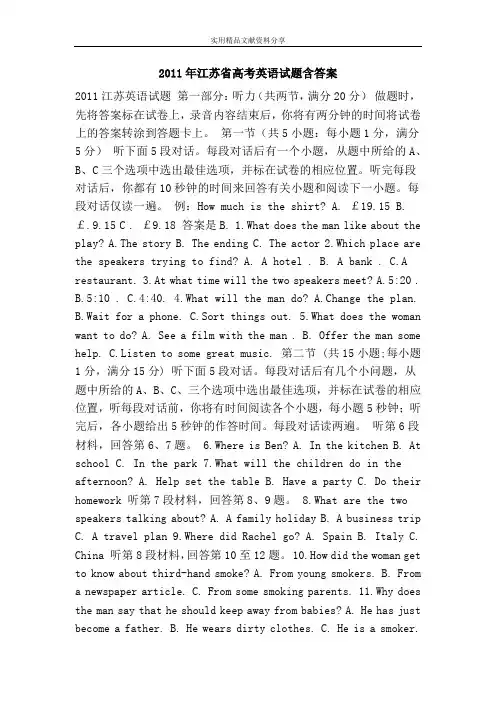
2011年江苏省高考英语试题含答案2011江苏英语试题第一部分:听力(共两节,满分20分)做题时,先将答案标在试卷上,录音内容结束后,你将有两分钟的时间将试卷上的答案转涂到答题卡上。
第一节(共5小题:每小题1分,满分5分)听下面5段对话。
每段对话后有一个小题,从题中所给的A、B、C三个选项中选出最佳选项,并标在试卷的相应位置。
听完每段对话后,你都有10秒钟的时间来回答有关小题和阅读下一小题。
每段对话仅读一遍。
例:How much is the shirt? A. £19.15 B. £.9.15 C . £9.18 答案是B. 1.What does the man like about the play? A.The story B. The ending C. The actor 2.Which place are the speakers trying to find? A. A hotel . B. A bank . C.A restaurant. 3.At what time will the two speakers meet? A.5:20 .B.5:10 .C.4:40. 4.What will the man do? A.Change the plan.B.Wait for a phone.C.Sort things out. 5.What does the woman want to do? A. See a film with the man . B. Offer the man some help. C.Listen to some great music. 第二节 (共15小题;每小题1分,满分15分) 听下面5段对话。
每段对话后有几个小问题,从题中所给的A、B、C、三个选项中选出最佳选项,并标在试卷的相应位置,听每段对话前,你将有时间阅读各个小题,每小题5秒钟;听完后,各小题给出5秒钟的作答时间。
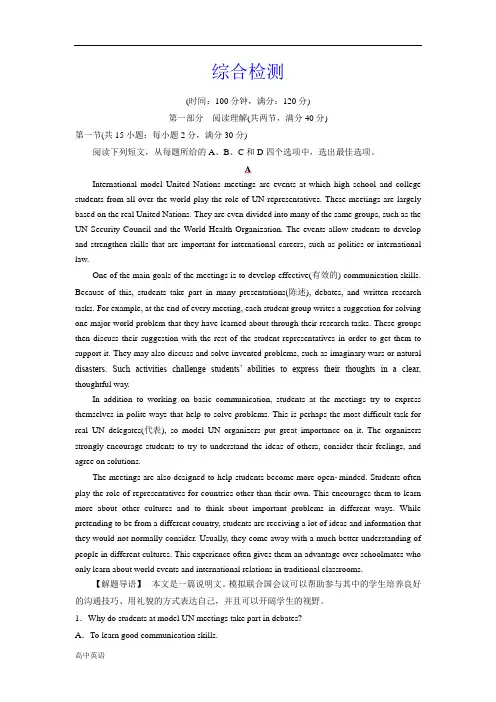
综合检测(时间:100分钟,满分:120分)第一部分阅读理解(共两节,满分40分)第一节(共15小题;每小题2分,满分30分)阅读下列短文,从每题所给的A、B、C和D四个选项中,选出最佳选项。
AInternational model United Nations meetings are events at which high school and college students from all over the world play the role of UN representatives. These meetings are largely based on the real United Nations. They are even divided into many of the same groups, such as the UN Security Council and the World Health Organization. The events allow students to develop and strengthen skills that are important for international careers, such as politics or international law.One of the main goals of the meetings is to develop effective(有效的) communication skills. Because of this, students take part in many presentations(陈述), debates, and written research tasks. For example, at the end of every meeting, each student group writes a suggestion for solving one major world problem that they have learned about through their research tasks. These groups then discuss their suggestion with the rest of the student representatives in order to get them to support it. They may also discuss and solve invented problems, such as imaginary wars or natural disasters. Such activities challenge students’ abilities to express their thoughts in a clear, thoughtful way.In addition to working on basic communication, students at the meetings try to express themselves in polite ways that help to solve problems. This is perhaps the most difficult task for real UN delegates(代表), so model UN organizers put great importance on it. The organizers strongly encourage students to try to understand the ideas of others, consider their feelings, and agree on solutions.The meetings are also designed to help students become more openminded. Students often play the role of representatives for countries other than their own. This encourages them to learn more about other cultures and to think about important problems in different ways. While pretending to be from a different country, students are receiving a lot of ideas and information that they would not normally consider. Usually, they come away with a much better understanding of people in different cultures. This experience often gives them an advantage over schoolmates who only learn about world events and international relations in traditional classrooms.【解题导语】本文是一篇说明文。
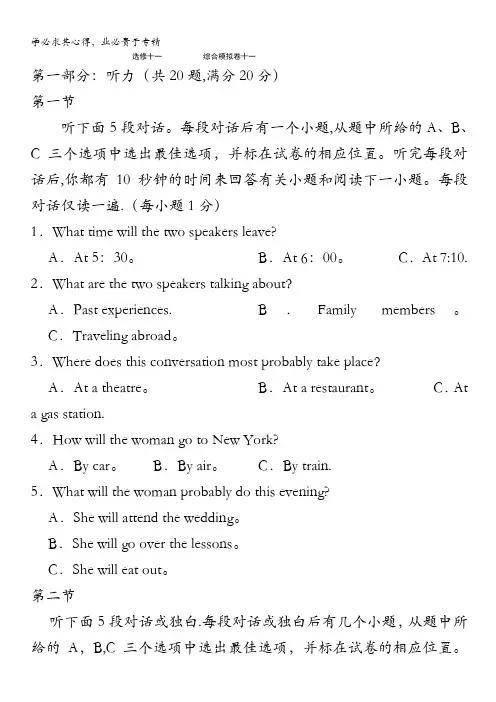
选修十一综合模拟卷十一第一部分:听力(共20题,满分20分)第一节听下面5段对话。
每段对话后有一个小题,从题中所给的A、B、C三个选项中选出最佳选项,并标在试卷的相应位置。
听完每段对话后,你都有10秒钟的时间来回答有关小题和阅读下一小题。
每段对话仅读一遍.(每小题1分)1.What time will the two speakers leave?A.At 5:30。
B.At 6:00。
C.At 7:10. 2.What are the two speakers talking about?A.Past experiences. B.Family members。
C.Traveling abroad。
3.Where does this conversation most probably take place?A.At a theatre。
B.At a restaurant。
C.At a gas station.4.How will the woman go to New York?A.By car。
B.By air。
C.By train.5.What will the woman probably do this evening?A.She will attend the wedding。
B.She will go over the lessons。
C.She will eat out。
第二节听下面5段对话或独白.每段对话或独白后有几个小题,从题中所给的A,B,C三个选项中选出最佳选项,并标在试卷的相应位置。
听每段对话或独白前,你将有时间阅读各个小题,每小题5秒钟;听完后,每小题将给出5秒钟的作答时间。
每段对话或独白读两遍.(每小题1分)听第6段材料,回答第6、7题。
6.What did the man do at his weekend?A.He watched TV. B.He went to the cinema。
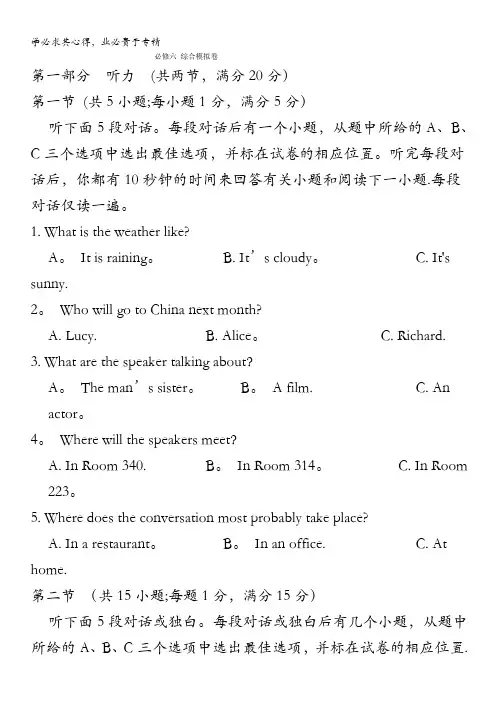
必修六综合模拟卷第一部分听力(共两节,满分20分)第一节(共5小题;每小题1分,满分5分)听下面5段对话。
每段对话后有一个小题,从题中所给的A、B、C三个选项中选出最佳选项,并标在试卷的相应位置。
听完每段对话后,你都有10秒钟的时间来回答有关小题和阅读下一小题.每段对话仅读一遍。
1. What is the weather like?A。
It is raining。
B. It’s cloudy。
C. It's sunny.2。
Who will go to China next month?A. Lucy.B. Alice。
C. Richard.3. What are the speaker talking about?A。
The man’s sister。
B。
A film. C. An actor。
4。
Where will the speakers meet?A. In Room 340. B。
In Room 314。
C. In Room 223。
5. Where does the conversation most probably take place?A. In a restaurant。
B。
In an office. C. At home.第二节(共15小题;每题1分,满分15分)听下面5段对话或独白。
每段对话或独白后有几个小题,从题中所给的A、B、C三个选项中选出最佳选项,并标在试卷的相应位置.听每段对话或独白前,你将有时间阅读各个小题,每小题5秒钟;听完后,每小题将给出5秒钟的作答时间。
每段对话或独白读两遍。
听第6段材料,回答第6至8题。
6。
Why did the woman go to New York?A。
To spend some time with the baby.B. To look after her sisterC。
To find a new job。
7. How old was the baby when the woman left New York?A. Two months。
学必求其心得,业必贵于专精必修四综合模拟试卷第一部分听力(共两节,满分20分)听下面5段对话。
每段对话后有一个小题,从题中所给的A、B、C三个选项中选出最佳选项,并标在试卷的相应位置。
听完每段对话后,你都有10秒钟的时间来回答有关小题和阅读下一小题。
每段对话仅读一遍。
1.Where does this conversation most probably take place?A.On the airplane. B.In the bookstore. C.At the post office.2.What’s the probable relationship between the speakers?A.Waitress and customer. B.Husband and wife. C.Friends. 3.Where is Mary's husband now?A.At the working place. B.Outside having lunch。
C.At home.4.When can the woman attend the conference?A.Wednesday & Thursday。
B.Wednesday & Friday。
C.Thursday & Friday.5.What does the man mean?A.He doesn’t like shopping。
B.He doesn’t want to talk about his job.C.He doesn't enjoy talking with the woman.第二节听下面5段对话或独白。
每段对话或独白后有几个小题,从题中所给的A、B、C三个选项中选出最佳选项,并标在试卷的相应位置。
听每段对话或独白前,你将有时间阅读各个小题,每小题5秒钟;听完后,每小题将给出5秒钟的作答时间。
学必求其心得,业必贵于专精选修MODULE 8 综合模拟卷八第一部分:听力(共两节,满分20分)第一节(共5小题;每小题1分,满分5分)听下面五段对话。
每段对话后有一个小题,从题中所给的A、B、C三个选项中选出最佳选项,并标在试卷的相应位置.听完每段对话后,你都有10秒种的时间来回答有关小题和阅读下一小题。
每段对话仅读一遍。
1.How does the man usually go to work?A.By car。
B. By bus.C. On foot。
2.What do you learn about the man?A.He is impatient。
B. He is proud.C. He is quiet。
3.What will happen according to the conversation?A.The woman is going to take the man to the office.B.Linda might be leaving earlier than the woman。
C.Linda might take the man to the museum。
4.What will the students do?A. Visit a car factoryB. Have a picnicC. Go camping.5.Who do you think the man is?A。
The woman’s boss。
B。
The woman’s coach. C。
The woman's teacher。
第二节(共15小题;每小题1分,满分15分)听下面5段对话.每段对话后有几个小题,从题中所给的A、B、C三个选项中选出最佳选项,并标在试卷的相应位置。
听每段对话前,你将有时间阅读各个小题,每小题5秒钟,听完后,各小题将给出5秒钟的作答时间。
每段对话或独白读两遍。
请听第6段材料,回答第6至8题。
高中英语必修五综合测试题二、单项选择21.—How long are you staying in China, Alice?—I don’tknow. _________.A. It depends onB. It doesn ’tmatterC. Never mindD. It depends22.Do you have anything _________, sir?A. to be washedB. to washC. washingD. being washed23.Nowadays, many farmers in our country want to_________ rural life and make a living incities.A. break upB. run out ofC. keep up withD. break away from24.—What’s the main idea of the passage, Julia?—I’m sorry, Mr White, I can’tmake _________ of it. It’s beyond me.A. senseB. understandingC. judgementD. idea25.—Did Roger fix the computer himself?—He _________ because he doesn’tknow much about the computers.A. has it fixedB. had fixed itC. had it fixedD. fixed it26.—Why did you _________ the second paragraph of your rewritten composition?—Because I thought it was off the point.A. make outB. leave outC. figure outD. put out27.The Chinese people _________ 56 nationalities, each of whom has their own characteristics.A. is consisted ofB. is made ofC. consists ofD. is made from28.My camera can be _________ to take pictures in cloudy or sunny conditions.A. adaptedB. revisedC. fitD. adjusted29.With a lot of difficult problems _________, the new manager felt like a cat on hot bricks.A. settledB. to settleC. being settledD. settling30.I feel it is your wife who _________ for the spoiled child.A. is to be blamedB. is going to blameC. is to blameD. should blame31.Paul failed in the exam again because he _________ confidence to pass it.A. lacked ofB. was lacking ofC. was lackingD. lacked32.Every politician admits the great power of _________.A. a pressB. pressC. the pressD. presses33.Our government must _________ the pace of construction in order to meet the demands ofordinary people.A. make upB. break upC. bring upD. speed up34.One of the ball sports, volleyball, is very interesting _________.A. to watchB. to be watchedC. to be watchingD. to watching35._________ with so much trouble, we failed to complete the task before the due time.A. FacedB. FacingC. FaceD. To face三、完形填空One day, a poor boy who was trying to pay his way through school by selling goods door to door found that he only had one dime left. He was hungry so he decided to beg for 36 at the next house.However, he lost his nerve when a lovely young woman opened the door. Instead of a mealhe asked for a drink of water. She thought he looked hungry so she brought him a large glass of37 . He drank it slowly and then asked,“How much do I owe you?”“You don’towe me anything,”she replied.“Mother has taught me38to accept pay for a kindness.”He said, “Then I thank you from the bottom of my heart.”As Howard Kelly left that house, he not only felt39 physically,but it also increased his faith in God and the human race. He was about to give up and quit40this point.Years later the young woman became critically ill. The41 doctors were baffled. They finally sent her to the big city, where specialists could be called42 to study her rare disease. Dr Howard Kelly, now a famous doctor,was called in for the consultation. When he heard the name of the town she came from, a strange light filled his eyes. Immediately, he43 and went down through the hospital hall into her room.44 in his doctor ’s gown he went in to see her. He recognized her at once. He went 45 tothe consultation room and determined to do his best to save her life. From that day on, he gavespecial attention to her care.After a long struggle, the battle was46 . Dr Kelly requested the business office to pass the final bill to him for approval. He looked at it and then wrote something on the47. The bill was sent to her room. She was afraid to open it because she was48that it would take the rest of her life to pay it49 . Finally she looked, and the note on the side of the bill caught her attention. She read these words ⋯“Paid in full with a glass of milk.”( Signed) Dr Howard KellyTears of50 flooded her eyes as she prayed silently, “Thank you, God. Your love has spread through human hearts and hands.”36.A. a meal B. a glass of water C. a glass of milk D. a light supper37.A. tea B. water C. milk D. coffee38.A. not B. never C. sometimes D. always39.A. weak B. weaker C. strong D. stronger40.A. at B. before C. to D. after41.A. best B. national C. famous D. local42.A. in B. for C. on D. at43.A. raised B. rose C. stood D. arise44.A. Wearing B. Dressing C. Dressed D. Putting45.A. out B. in C. away D. back46.A. succeeded B. defeated C. beaten D. won47.A. bill B. paper C. side D. card48.A. thinking B. positive C. informed D. negative49.A. off B. back C. out D. in50.A. sorrow B. worry C. relief D. joy四、阅读理解AFor a long time people have believed that high self-esteem is the key to success. However, new research shows that focusing just on building self-esteem may not be helpful. In some cases,having high self-esteem can bring bad results if it makes you less likeable or more upset when you fail at something.“Forget about self-esteem, ”says one of the psychologists involved in the new research.“It’s not the most important thing. ”This idea may sound a bit strange to you because studies also show that people with high self-esteem are less likely to be anxious, shy, or lonely than those with low self-esteem. In short, to feel good does you good.But, after reviewing about 18,000 studies on self-esteem, Roy Baumeister, a psychologist at Florida State University, has found that building u p your self-esteem will not necessarily make you a better person. He believes that violent and evil people often have the highest self-esteem of all. He also said, “There’s no evidence that kids with high self-esteem do better in school. ”All types of people have problems. “People with high self-esteem can have big egos ( 自我 ) that can make them less likeable to their peers, ”said Kathleen V ohs, a psychology professor atColumbia University. “People with high self-esteem tend to ( 趋向于 ) think more of themselves, ”Vohs says. People with low self-esteem are more likely to rely on their friends when they need help.Researchers say it is best to listen to and support other people. Find positive ways tocontribute to society. If you fail at something, try to learn from the experience. The best therapy( 药方 ) , as they suggest, is to recognize your faults, accept yourself, understand your weaknesses and then do something about them.51. What ’s the author’s attitude towards high self-esteem?A. Objective.B. Subjective.C. Neutral.D. Indifferent.52.What ’s the passage mainly about?A.High self-esteem is the key to success.B.New research shows that high self-esteem may not be helpful.C.New research shows that high self-esteem can only bring bad results.D.People with high self-esteem are less likeable.53.What does the underlined part “a better person”probably mean?A.A person who is friendly and kind.B. A person who is successful and wealthy.C. A person who is successful and brave.D. A person who is helpful and supportive.54.Which of the following is NOT true according to the passage?A.People used to think that high self-esteem led to success.B.According to the psychologists in the passage, high self-esteem is more negative than positive.C.People with low self-esteem are less likely to depend on their friends.D.People with high self-esteem tend to be prouder.55.What can be inferred from the last paragraph?A.The best therapy mentioned is mainly for people of all kinds.B.The best therapy mentioned is mainly for people with low self-esteem.C.The best therapy mentioned is mainly for people with high self-esteem.D.The best therapy mentioned is mainly for people who fail at something.BThe role of a newspaper is to present and comment on the news. It is vital for keeping people well-informed on current affairs. In most Western countries, journalists try to shape the ideas and opinions of their readers, since in Western countries all newspapers are independent of the government. Some newspaper owners support liberal ideas including economic policies that help poor people. Other owners want policies such as lower taxes for rich people and less money tobe given to poor people. You can almost judge the political ideas of a person in the West bylooking at the newspaper he reads.All newspapers report national and international news. They give the facts but also provide opinions on controversial issues in the editorials and columns of opinion. The readers of the newspaper can also comment on these editorials or articles. There are many informative articlestoo as well as reviews of new films and books, etc. These are very important, for if a film or bookgets good reviews it will often become more successful.All these articles require many journalists who are experts in different areas of life. All these articles come together and are checked by the chief editor of the newspaper. When he or she hasmade a decision on the articles, the newspaper is prepared for printing. All this work means thatthe journalists must work together as a team because there is a lot of pressure when you work in a newspaper office. There are constant deadlines and articles have to be fitted round advertisements, photographs and much, much more.56.What does the underlined word “be fitted ”mean?A. be suitableB. be putC. be readD. be measured57.What articles comment on controversial issues?A. Editorials and opinion columns.B. News stories.C. Some of the informative articles.D. Jokes and humour.58.Which is true about the journalists in Western countries?A.There ’s no time limit for their report articles.B.They have no right to influence the reader s’opinions.C.A newspaper can come out with just a journalist working individually.D.Journalists must submit their articles before the due date.59.Why are good reviews important to books?A.Good reviews are excellent introduction to books.B.Readers especially favour books with good reviews.C.Good reviews can make readers feel relaxed and comfotable.D.Good reviews can bring a large circulation of the books reviewed.60.Which of the following sentences best fits at the end of the last paragraph?A.The number of people needed to produce a newspaper varies greatly.B.The staff of a daily newspaper is headed by a publisher.C.The articles printed in the newspaper should cover national and international affairs.D.The entire staff must operate as a well-drilled team if the papers are to reach homes andnews-stands on schedule.五、阅读下面的短文,根据上下文和空白处首字母的提示补全单词About 500 years ago a great man71name was Ota Dokan lived in Japan. He built a home on a bay around which a busy little town grew up. Ota wrote a poem about his beautiful home. In the72 , he could see the blue sea and the great mountain of Fuji from the roof of his house next to many pine trees.The little town that began 500 years ago is today the great city of Tokyo,73of Japan.Over 12.7 million people live there. No other city in the world has so many people.Today Ota’s poem is remembered with sadness. The pine trees he wrote about died74 pollution. The beautiful mountain of Fuji can be seen only one day75of ten. Most of thetime it cannot be seen because of the deadly clouds of76monoxide ( 一氧化物 ) .Things are so bad that a swimmer died in the Sumida River, not from drowning but from 77in the poisons in the air. One July day 8,000 people went to the hospital because they felt78from the deadly smoke that stayed over the city.Every big city in the world faces the same problems as Tokyo. People must do something about these79problems now or they will kill themselves off. They will not be able to breathe the air or drink water,80will they be able to see the blue sky any longer.71.72.73.74.75.76.77.78.79.80._Key:二、单项选择21.D解析:It depends看情况;It depends on后要接。
阶段评估检测(五)必修5(120分钟 120分)第一部分听力(共两节,满分20分)第一节(共5小题;每小题1分,满分5分)听下面5段对话。
每段对话后有一个小题,从题中所给的A、B、C三个选项中选出最佳选项,并标在试卷的相应位置。
听完每段对话后,你都有10秒钟的时间来回答有关小题和阅读下一小题。
每段对话仅读一遍。
1. How does the man feel about his job?A. He doesn’t care much about it.B. He enjoys it very much.C. He doesn’t like it.2. What is the woman probably going to do?A. Ask Tom to send an invitation.B. Get the Johnsons’ address.C. Invite Tom to the party.3. What does the woman mean?A. Jane is looking for a summer job.B. Jane doe sn’t want to go home.C. Jane is eager to go home for the summer.4. Why is the woman excited?A. She has got a driver’s license.B. She has sold a lot of tickets.C. She is going abroad.5. What does the man think of Picasso?A. He thinks that he is the greatest Spanish painter.B. He doesn’t consider him the best Spanish painter.C. He is sure that he can become famous.第二节(共15小题;每小题1分,满分15分)听下面5段对话或独白。
必修五综合模拟卷第一部分听力(共两节,满分20分)第一节(共5小题;每小题1分,满分5分)听下面5段对话。
每段对话后有一个小题,从题中所给的A、B、C三个选项中选出最佳选项,并标在试卷的相应位置。
听完每段对话后,你都有10秒钟的时间来回答有关小题和阅读下一小题。
每段对话仅读一遍。
1. Where does the conversation most probably take place?A. In an office.B. In a library.C. In a bookstore.2. Where did the speakers plan to go?A. A shopping center.B. An opera house.C. The parking lot.3. Which aspect of the film does the woman like?A. The plot.B. The music.C. The dialogue.4. Wha t do we know about the woman‟s jacket?A. It is sold at a lower price.B. Its color is her favorite.C. It is her sister‟s size.5. What does the woman imply(暗示)?A. The man is so forgetful.B. The man is too careless.C. The man is over confident.第二节(共15小题;每题1分,满分15分)听下面5段对话或独白。
每段对话或独白后有几个小题,从题中所给的A、B、C三个选项中选出最佳选项,并标在试卷的相应位置。
听每段对话或独白前,你将有时间阅读各个小题,每小题5秒钟;听完后,每小题将给出5秒钟的作答时间。
每段对话或独白读两遍。
听第6段材料,回答第6、7题。
6. What makes the man so tired?A. Playing games.B. Surfing the Internet.C. Searching for interesting people.7. Whom did the man chat with?A. People from Canada.B. People in need of his help.C. People on the same project.听第7段材料,回答第8、9题。
8. What does the law forbid people to do?A. To take dogs to parks.B. To walk dogs in the streets.C. To treat dogs cruelly.9. What do we know from what the woman said?A. Dogs should be kept at home.B. Building a dog park is necessary.C. People would remove the dog waste.听第8段材料,回答第10至12题。
10. According to the man, what did he do before he watched TV?A. He washed his hands.B. He had his supper.C. He took a path.11. What place did the man go to last night?A. James Street.B. A restaurant.C. A friend‟s home.12. What does the man try to do in the conversation?A. To prove the truth.B. To find the truth.C. To hide the truth.听第9段材料,回答第13至16题。
13. Why did the son come back late?A. He hurt his hands and knees.B. He went to a pub with Linda.C. He waited a long time for the bus.14. What was the old lady doing in the middle of the road?A. Looking for something.B. Struggling to stand up.C. Trying to seek help.15. What happened to Linda?A. She was fired.B. She got injured.C. She had an accident.16. Where was the witness?A. Outside the pub.B. At a bus stop.C. In his car.听第10段材料,回答第17至20题。
17. What‟s the problem of some of the university students?A. They don‟t spend all their time on studies.B. They don‟t know what to do with their free time.C. They don‟t have choices for outside class activities.18. How is the stude nts‟ high school life?A. Controlled and busy.B. Regular and colorful.C. Active and independent.19. According to the speaker, what is the role of outside class activities at university?A. To make students healthier.B. To improve students‟ test sco res.C. To enrich students‟ experience.20. What does the speaker advise his students to do?A. Learn to enjoy themselves.B. Learn to be their own masters.C. Learn to develop their potential(潜力).1-5 CBCAC 6-10 BABCA 11-15 ACBAC 16-20 BBACB听力录音原文Text 1M: Excuse me. Is this dictionary available?W: Ur…Oxford Learners Dictionary, the seventh edition? I am sorry. It‟s sold out.M: Oh, that‟s too bad.Text 2W: Did you see the purse, honey?M: Your purse? No. Why the purse? We‟re not going shopping anyway.W: I know. But our opera tickets are in it. And we have only one hour left.M: Did you have it when we left the parking lot?Text 3M: What do you think of the film, Ellen?W: Well, the plot is not so good.M: But the music…W: The music is just so-so. Anyway, the dialogue is humorous.Text 4M: You look smart in this red jacket.W: Thank you. A really good bargain, I think. You can get one for your sister. It goes on sale today. M: Y es, but I don‟t know what size she takes.Text 5W: Hi, John. How is your exam?M: It couldn‟t be better.W: Really? But remember this: hope for the best and be prepared for the worst.Text 6W: You look tired.M: Yeah, I am worn out. I‟ve been surfing t he Internet.W: Were you doing school work or playing games?M: Well, I wanted to get some information about Canada for my project, but I found a really interesting chat room with people from that country and started chatting.W: Did you get the information you needed?M: Yes, but then we spent a lot of time chatting about other interests.Text 7M: I hear a businessman is building a dog park in our city.W: Really? What for?M: Obviously because there‟s a law against having dogs in the streets.W: Does it mean that dogs have to stay at home all the time?M: Sounds pretty cruel, right? Maybe a dog park is a good idea.W: Maybe they should just allow people to walk their dogs in the streets.M: But then streets could be a mess.W: Couldn‟t people clean up af ter their dogs?M: Would they?Text 8W: Mr. Parker, when did you arrive home yesterday evening?M: At about 8 o‟clock.W: What did you do right after you entered your flat?M: Well, I washed my hands and then watched sports news.W: When did you have supper?M: At about a quarter to nine, I guess.W: Did you stay at home all evening?M: Yes.W: But your friend says that he found you several times between 8 and 9. But you didn‟t answer. M: Well, I think I was in the bath at that time.W: No, you weren‟t. Yo u were not even at home last night. You robbed a bank in James Street.Text 9M: Hi, mom.W: There you are. I‟m getting worried. It‟s so late.M: Yes. I ran into Linda and we went to a pub. She told me a funny thing.W: Oh? What was that?M: Well, she was driving home after work, and she suddenly saw an old lady on her hands and knees in the middle of the road.W: Really?M: Yes, Linda was so shocked that she stopped suddenly and the car behind crashed into hers.W: Was she hurt?M: No.W: And what was the old lady doing?M: I am just coming to that. So Linda got out of her car and saw the old lady pick up something and walk away.W: Lucky indeed. Linda didn‟t run her over.M: Then a policeman came. But he didn‟t believe what Linda said.W: Well…M: Luckily there was a witness, a man waiting for a bus. He saw it all. Guess what the old lady was doing?W: I haven‟t the slightest idea.M: She was looking for her gold tooth.W: A gold tooth?M: Yes, it fell out as she was crossing the road. The witness heard h er saying, “Oh, my gold tooth…” Text 10In my spoken English class, I asked the students about their impressions of their university life. To my surprise, many of them expressed disappointment. After their highly controlled high schoollives, they were having difficulty adjusting to the free time in the university. When I asked them to describe their high school lives, many of them told me they got up at six in the morning and studied until ten at night. Most of this time was spent at school, doing piles of homework to help them prepare for the university entrance exams.Once they entered the university, in my opinion, the students are not expected to devote all their waiting hours to studying, they should also take an active part in social activities. Therefore, they should learn to divide their time outside of the class between sports and clubs. What‟s more, they should spend some time watching TV and chatting with their roommates. These activities are useful in helping them prepare for their future. But what struck me most was that many of them did not seem particularly happy about their new found freedom. As they had so many choices, they felt that no matter what they were doing, they should be doing something else. That‟s why they were not happy.To those students, my advice was, get used to it and learn to make decisions for yourselves.第二部分:英语知识运用(共两节,满分35分)第一节:单项填空(共15小题;每小题1分,满分15分)从A、B、C、D四个选项中,选出可以填入空白处的最佳选项。